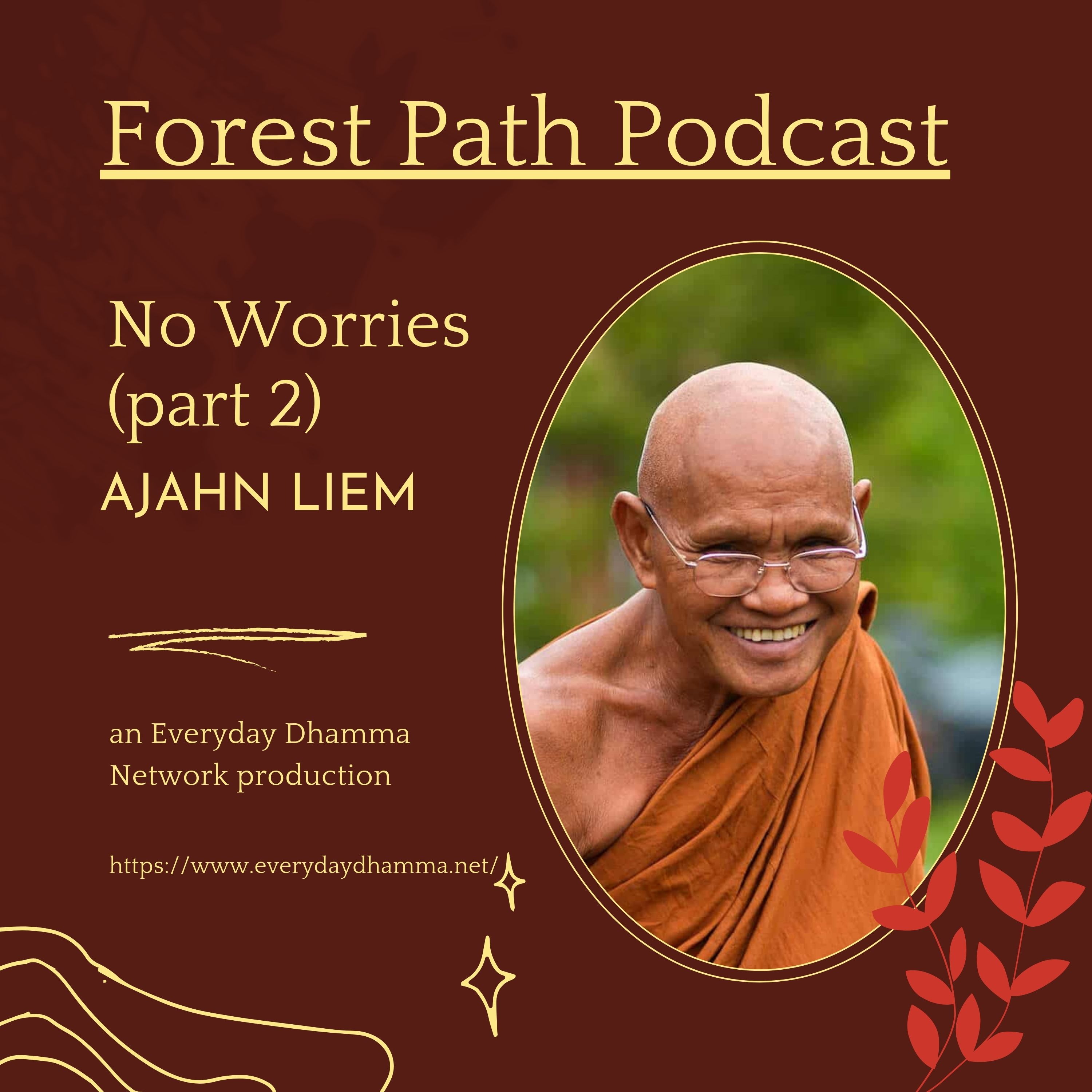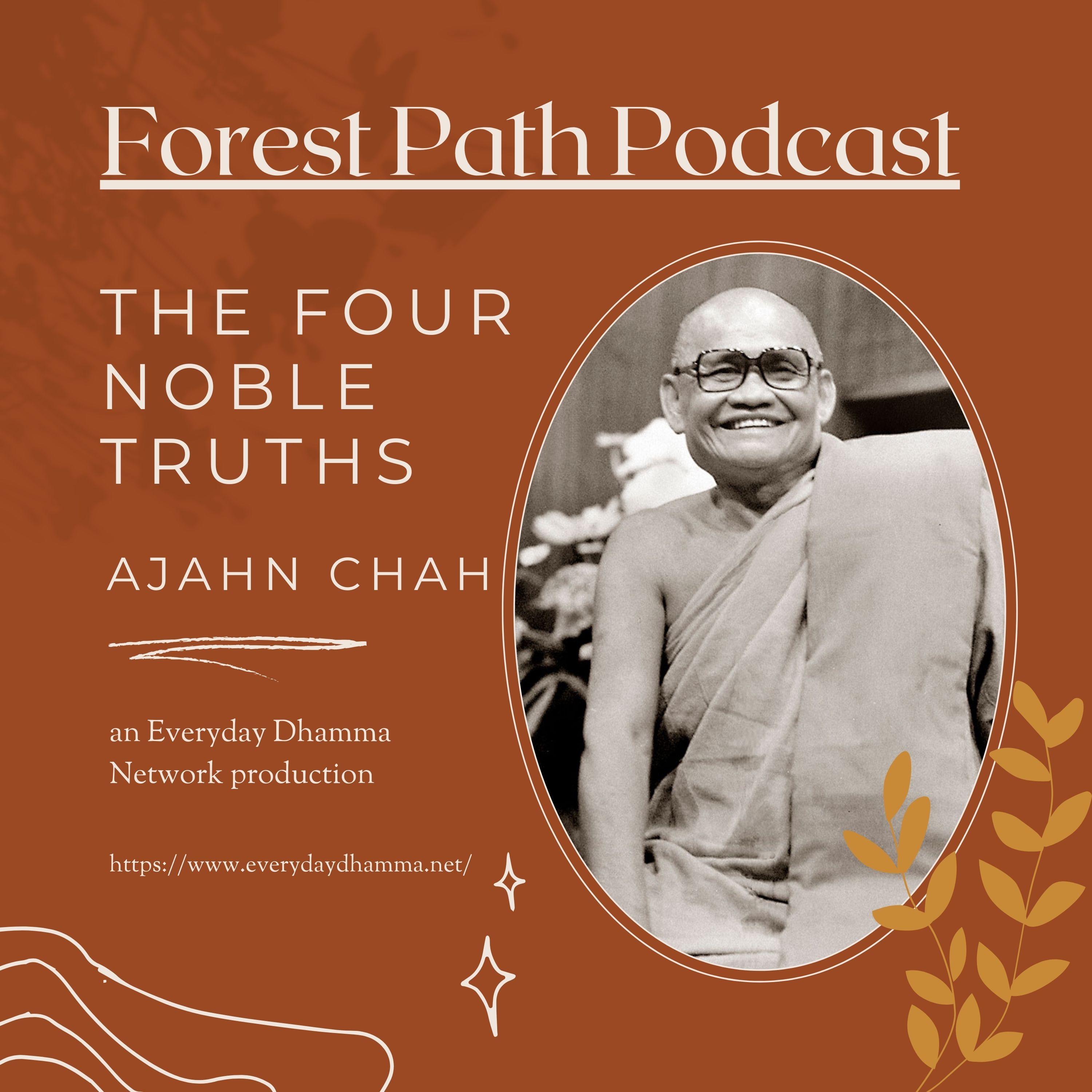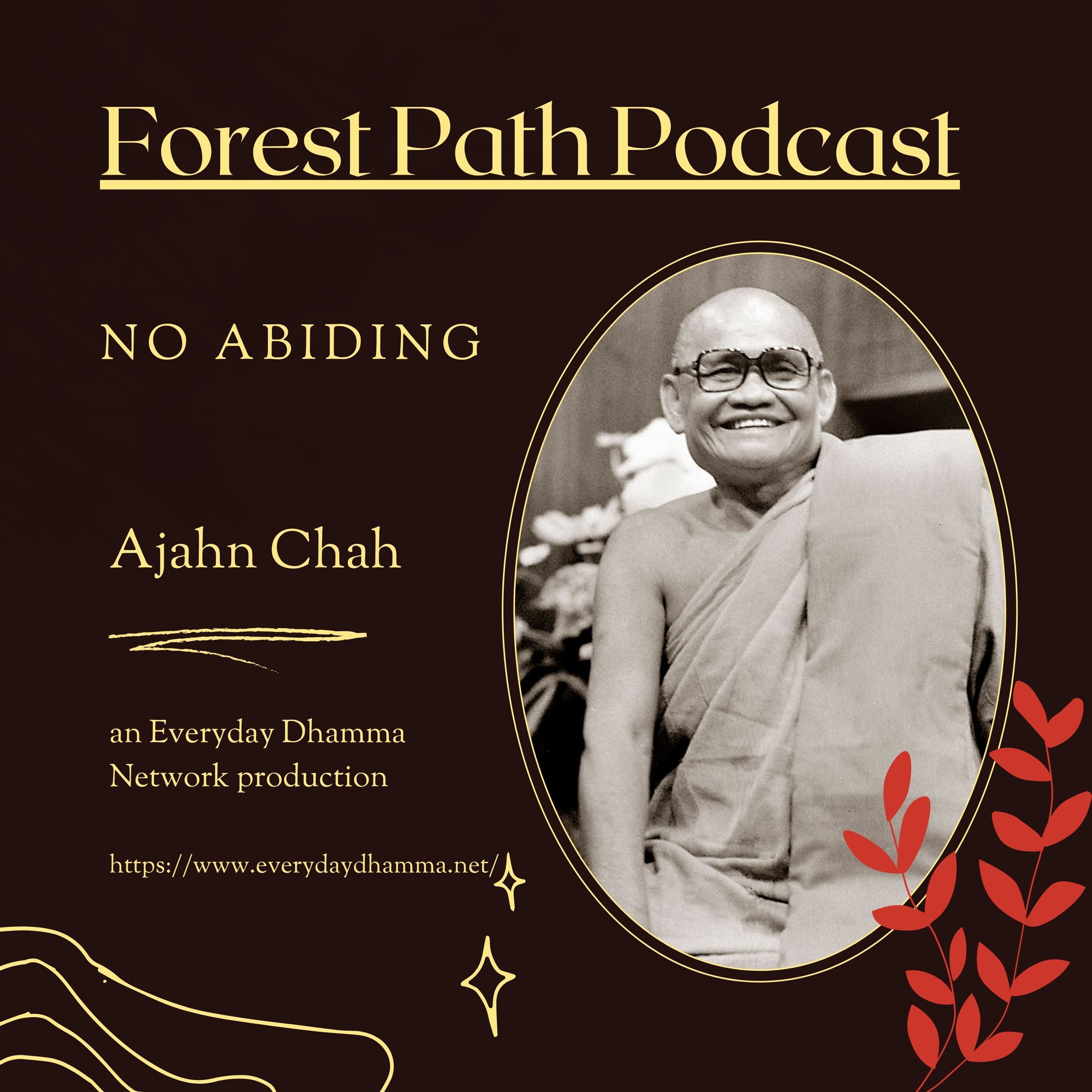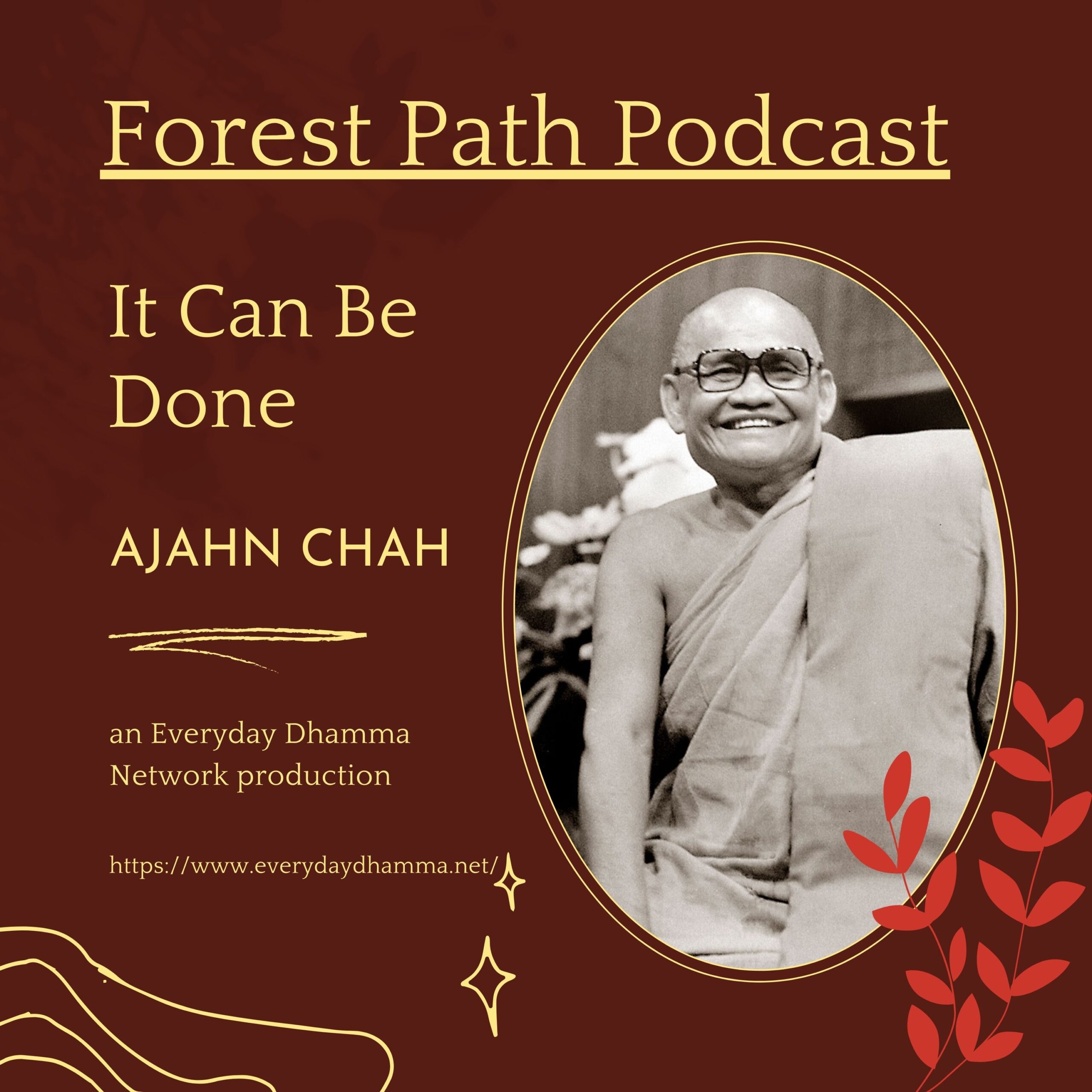Episode Transcript
Seclusion from Society
Human beings are beings that live in society, and there has to be communication, so inevitably we need to relate to all kinds of different impingements coming from society. We need to face the whole variety. So the Buddha advised us to lead our lives consciously aware, with mindfulness and clear comprehension, in the very moment that we get into contact with the world. There is the eye that sees forms and shapes, there is the ear that hears sounds, the nose that smells odors, the tongue that tastes, the body that feels contact, and – finally – there are images arising in the mind caused by these objects.
All these experiences need filtering. They need to be faced with caution – that means, in a way that enables one to understand all the various impingements that occur. If one sees things clearly, all these objects will lose their value by themselves.
This process is just like when we are together with children. Children find a lot of fun in playing around. But if we see the toys of a child, we probably all agree that they are meaningless – a puppet for example.
If we look back on our experiences, after some time, we start to see them as merely a heap of trash, as something that isn’t of any real use. We don’t give importance to these things any more – whether it’s anger, greed or delusion, desire, aversion or ignorance – all this we will see as heaps of trash. Trash is probably not something all too desirable for people. No one sees any value in trash, so it fades away from our consciousness. The mind state of anger fades away, the mind state of greed fades away. Eventually seclusion from these states arises. Seclusion from association with “society” arises – seclusion from “society” with what the eye sees, the ear hears and the nose smells.
When the feeling of seclusion has arisen, there is shade and coolness, and we experience that we have a refuge. Having a refuge grants us freedom from worries. It feels like living in a house sheltered from the sun and the rain, the heat and the cold. There is nothing that can cause us trouble.
Granting Opportunity
The Buddha suggested for people that practice together in groups and are interested in the welfare of their community to give each other the invitation for admonishment. The Buddha called this pavrana, to “give each other opportunity.” In the conventional framework of the monastic society, pavrana is a formal communal duty.
It means to grant each other the opportunity for admonishment and constructive critical comments. Criticism here is not done with a mind state that is fixed on one’s views, opinions or conceit. It is simply meant to point out issues that arise, or warn each other about potential problems. It is done without any arrogance or conceit, because all of us are not perfect as we walk this path.
Sometimes we only look ahead and don’t see what’s behind us. Maybe we have some weak points. Here we rely on others to shine a light. Or they can show us a mirror to see ourselves more clearly and help us focus our attention on areas where we need to grow. This is why we grant each other opportunity for criticism. In this way development can take place.
When somebody points out where we are at fault or didn’t do well we simply accept it. We trust that it is not out of prejudice that another person warns us about what we are not doing correctly.
Whenever we act with strong emotions such as anger or even physical violence, we need to admit that this is ugly, dirty behaviour. If we grant others the opportunity to address us, it helps us to re-establish our awareness of what we are doing. Behaviour that we don’t like, other people probably won’t like as well. Such actions are unacceptable in society. If we do them we tend to annoy others and might be perceived as an unskilful person.
The Sangha practices pavrana as a formal communal ceremony that has to be carried out irrespective of rank, status and age of membership in the group. It also is done irrespective of the experience and skills one has.
The Society of Trees
Living together we rely on each other. This can be compared to the “social life” of a forest. In the “society of trees” it is not the case that all trees are the same. There are big ones and small ones. In fact, the big trees also have to rely on the small ones and the small ones on the big ones for the situation to be safe. It isn’t true that a tree isn’t threatened by dangers only because it is big. When a storm comes it is the big trees that fall. Similarly the small trees need to rely on the big ones. If there weren’t any big trees to lean on they’d break.
Any society needs to cooperate like this. Following the principles that the Buddha laid down can mitigate the problems that occur when unbeautiful situations arise. Human beings should use their intelligence, their faculties of mindfulness and wisdom, and rise above the behaviour of the animal realm. That’s why the Buddha praised the qualities of mindfulness and wisdom.
Utterly Normal
If we see the normal suffering of living in society as something very heavy, it is indeed very heavy. If we see it as something natural, it becomes simply natural. Just like when we look at a tree, if we see it as something big, it becomes big, if we see it as small, it becomes small. But if we neither consider the tree big nor small, then there won’t be much to say about it. It becomes utterly normal that way.
A Dam
Sometimes, in our situation of living in a society with very wide boundaries – this community living together in the world that we could call our “big family”
– we need to use a lot of patient endurance. When situations arise where we have the feeling that we don’t know where we are at, we might carelessly do something wrong, so we generally should be able to patiently hold ourselves back a bit.
Patient endurance is a kind of energy. It is just like the energy that is generated from the dam of a reservoir that retains water, like we have here close to Melbourne. Patient endurance similarly is a potential ready to benefit us.
We patiently endure circumstances where we come into contact with emotions from people around us. Whether we receive what we wish or not, we endure patiently. If it is the case that we can let go of things and put them down, patient endurance becomes renunciation or sacrifice in itself, an important quality for mutual support in society that gives us a better understanding of life.
A Praiseworthy Duty
I really would like to praise the workers that do the duty of taking care of human beings that have come to the end of their existence, namely, that have reached death12. They do their work in a very motivated way
when they arrange cremations so that they don’t display any offensive, ugly sights. They do their work as if they were the blood-relations or brothers and sisters of the departed.
This is a way of relating to our friends in the human realm that pays respect to the fact that everybody is in the same situation of birth, old age, sickness and death, a situation that can’t be avoided. To take care of each other in this way is indeed something most praiseworthy.
Ceremonies like this reflect the way we fulfil our duties of support and care for each other. The Buddha praised this duty towards the departed. He wanted the monks in the Sangha to take care of their fellow practitioners who have reached the end of their lives in a neat and orderly way, seeing it as chance to do service to one another.
Sick Persons
That we sometimes feel displeased when we are confronted with society is due to contact with the worldly dhammas, the fear and dread that comes from other people. If others are pleased with us, they will praise us, if they are displeased, they will blame us. When they blame us, we sometimes feel insulted and unhappy. But if we actually saw it from a perspective of mindfulness and wisdom, we’d realize that those who blame us must be in a state of suffering, they must be feeling unwell. They should be compared to people who have an illness, whose health is deteriorating. Those who do the duty of looking after sick persons, the nurses and doctors, know well enough, that sick persons usually behave in a way that shows irritation and discontent. Nurses or doctors wouldn’t pay attention to behaviour like this. They would consider it normal for a sick person.
Our situation is similar. We should see the people who express criticism towards us in a way that gives rise to loving-kindness, goodwill, friendliness and compassion (metta and karuna ), as those who are making the criticism are in a state where their hearts are afflicted and they don’t know themselves anymore. If we can give rise to feelings of mett we won’t fight back but rather express friendship and support. In this way we give the emotions the chance to settle down, abate and become peaceful.
They Don’t Want it
Having cut off the defilements of greed, hatred and delusion, the Buddha was able to spend a life without negativity and anger. His mind was abundant with benevolence and compassion – mett. But not the kind of mett that is still associated with tanh. Mett that goes together with desire is still insufficient, still not perfect.
The Buddha suggested to simply look at the world in the light of emptiness, to see through the world as void. He didn’t say that we should think that we are supposed to help out and give support whenever we see a person suffering and in pain. This is not the way the Buddha saw the world.
The Buddha said:
Kammun vattati loko
(The world is driven by kamma13).
If we start giving advice to people who are still under the influence of their kammic dispositions they will object to our advice. They won’t accept our help. They don’t want it.
You can compare this to giving food to an animal
– for example human food to water buffaloes or cows. They don’t want it. What they want is grass.
Infatuation With the World
The Buddha taught that the beings in the world – which means the world in our own minds – are constantly situated in the realm of sensual desire. We experience sensuality carrying us away. We constantly are travelling around in the realm of desires, based on desirable objects.
Desirable objects actually refer to this very “self” and the material things that relate to it. They make us feel obsessed, infatuated and captured. That’s why the Buddha taught us to make an effort to see these processes in the world and ourselves with insight. If we focus on these processes in accordance with their true nature, we’ll recognize them as experiences which are not fully perfect and evidently deficient.
One needs to realize that infatuation with the world is a state of imperfection which leads us to experience discomfort and all kinds of sorrow and bereavement. Both pain and pleasure, good and evil eventually cause us to feel imprisoned in a state of suffering that burns us up.
We need to make an effort to see this in order to react to it and change our attitudes towards it, seeing the danger in the round of existence. We become one who is alert and careful when he relates to the world, becoming someone who sees worldliness as something to get rid of, along with all the associated infatuations, involvements, and entanglements. In turn we aspire for liberation and escape from our identity and self.
Well Equipped
If one divides the dhammas that lead to awakening (bodhipakkhiy dhamm ) up, as it is generally done in the Buddhist scriptures, they comprise:
the four right efforts, the four foundations of mindfulness, the four bases of power, the five faculties, the five powers, the seven factors for awakening, and the noble eightfold path.
If one wanted to summarize all these factors into a single one, it would surely be the factor of mindfulness.
All of us are already well equipped with the four foundations of mindfulness – the body, feelings, the mind and dhammas – in one way or another. We indeed have a body and we do have feelings, whether they are feelings of happiness or suffering, appreciation or aversion. Our memory and our awareness are well accomplished. We do experience sankhras, the proliferations of the mind, whether they are good or evil qualities, and we possess consciousness (viññna ), the faculty of receiving information coming from the sense organs. So we really need to put this teaching of mindfulness into practice.
Mindfulness should be established in relation to every situation of our lives and in the very moment we experience it. That’s why the Buddha taught us to lead our lives with awareness and clear comprehension, mindfully focusing, observing and investigating.
What we need to do first is to try to settle our minds in the present, not worrying about the past and the future, giving rise to the present moment (in our minds), becoming established in this place of full perfection. The present moment is both cause and result, as it is in the present moment that we create good or bad causes and conditions (for the future). For this reason the Buddha taught that we should lead our lives in a way that is conscious and aware.
So, these dhammas that lead to awakenening are something that we already possess. Coming together and supporting each other in the practice, especially living in a place like this monastery, we don’t need to experience the ties to the outer world with all the chaos and difficulties of society.
All that is left for us to do is to study ourselves, observe ourselves in a more careful and circumspect way. Applying care and circumspection will give rise to right view (samm ditthi. ). Right view itself actually equals peace.
What is it that one sees when one has right view? One sees dukkha as something that should be known, one sees the cause of dukkha as something to abandon, one sees cessation – anicca, dukkha, anatt 14 – as some-
thing to realize, and one relates to life in a composed and restrained way. These are the Four Noble Truths, dukkha, origin, cessation and path. Living one’s life in accordance with these truths, one can say, is the bodhipakkhiya dhamma, the dhamma leading to awakening. Right view takes one to clear under- standing, to peace, coolness. It takes one to purity of mind.
These dhammas are qualities that are appropriate for us to develop and make much of. Everybody is able to do this if he puts forth effort, if he puts his heart into it, gives it importance and doesn’t stop, doesn’t give up. This is what they call relentlessly walking until one reaches one’s goal at the end of the path, until one succeeds.
“Viriyena dukkham accenti”
(Dukkha can be overcome through effort)
This is a very clear statement of the Buddha, so we should practice and conduct ourselves accordingly. Don’t fall under the influence of the hindrances of laziness or slackness. Laxness and sluggishness weaken us, drain our strength and lull us to sleep. What we need is resoluteness. Have you ever heard how the Buddha made the firm resolution:
“Willingly, let only my skin, sinews and bones remain, and let the flesh and blood in my body dry up, but I will not get up and relax my energy, nor stop putting forth effort until I attain awakening.”
This vow of the Buddha shows that he had very strong and firm determination. He was truly a noble person. We could call him the ideal, perfect being, even a “hero”, a man with outstanding, unparalled stead- fastness of mind. He didn’t have thoughts of “I can’t do this”, because the Dhamma is something that human beings are capable of carrying out and putting into practice. All of us are human beings, so this should be sufficient for acknowledging the fact that there must be at least some way to give rise to that which is of true benefit.
No Conflicts
In a certain sense, what is called “entering the stream” (sotpatti ) in the scriptures means the reduction of the forcefulness related to the way we live our lives,
becoming somebody who is possessed of peace. A
stream-enterer has alleviated greed, desire, hatred, anger and diminished delusion and ignorance. It means that he lives his life less violently. All kinds of conflicts gradually become less and are finally resolved.
A life with no conflicts at all is a life where one truly feels happy. This kind of happiness stems from having no dark character traits. There is nothing that can give rise to anxiety in any way. It is truly a good way of existing.
In the time of the Buddha one could find many examples of this, because the disciples of the Buddha generally led their lives in a virtuous, mindful and wakeful way. If someone is possessed of this quality of presence of mind, their spiritual and emotional life is generally in a wholesome state. There is the feeling of being on a path without obstructions and dangers.
To lead one’s life like this is not only the task of a monk. Everyone who is still alive has the duty to live with an attitude of mind that doesn’t give rise to conflicts.No Worries
After one has reached seclusion from sensual pleasures and unwholesome states of mind in the practice, all kinds of things stop arising and proliferating in the mind, even what we call “vitakka ” (thoughts). Only mindfulness and clear comprehension remain. The entire range of unwholesome thoughts has been abandoned.
“Unwholesome thoughts” also refers to the wish to have ever-increasing pleasure in life. As we know, to indulge in sensual pleasures is reckoned as a danger in the Buddha’s teaching, and so is the wish for more and more of it in the future. All these thoughts need to be cut off.
When unwholesome mind-states cease, one is left with an experience of rapture and joy (pīti ) and a feeling of great happiness (sukha ). Following rapture comes the experience of this tremendous happiness. But if one looks carefully, this happiness also has its drawbacks. It can turn into a kind of derangement or distortion of perception, called “vipallsa ”. Vipallsa is the opposite of vipassan 15. Vipassan means the revelation of clarity, an experience of complete understanding.
So when these feelings of rapture and bliss arise, what we need to do is to continue to uphold mindfulness, so that we don’t get lost and deluded at the point when we experience this immense happiness. Don’t mistake yourself to have attained to being “this” or “that”. One has to be able to let go and get down to the level equanimity (upekkh ).
In simple words: stop the speculations and concerns and just be mindful. Stay in the reality of the present moment, the paccuppanna dhamma. No worries about anything.
If one practices like this, there will be true happiness with no concerns about external things. No worries about one’s conditions of living. One could either eat or not eat. The Buddha proved this to us with his enlightenment. Did you ever notice that after he had finally eaten Sujta’s milk-rice (on the day of his enlightenment), all he did was to do his duty in putting forth effort in meditation? There was not the slightest concern about the requisites one needs to sustain a living.
All the Buddha consumed was the bliss of seclusion, the result of having cut off his cravings and defilements. This experience changed everything completely. If there is no more black any more, every- thing becomes white – that’s a law of nature. It is a change that automatically takes place, ruled by nature.
We will experience a feeling of not desiring anything, neither liking nor disliking things in the way ordinary people do. The sense organs are still in use, but in a way that there is nothing that gives rise to a bigger picture deluding us16. The ear keeps hearing sounds, but without the deceiving context. The eye still
sees things – you can see men and women, but without illusions.
It is a different experience than that of an ordinary, unenlightened being (puthujana ), who imme- diately thinks “this is good,” when he sees something or, “this is no good,” when he sees something else. The difference lies in that the enlightened person doesn’t have feelings of agreement or disagreement. This is where the enlightened person is different from an ordinary one. This is the nature of the change that takes place in enlightenment.
Have you ever experienced something like this?
Anybody can experience this! (Luang Por laughs…)




